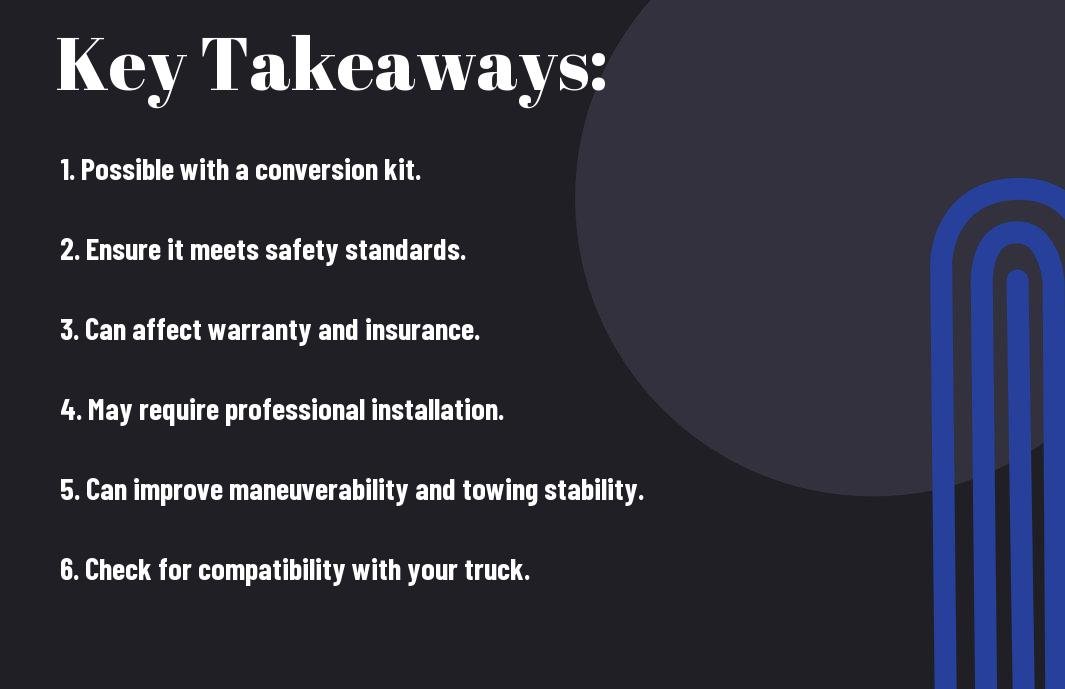Are you considering converting your fifth wheel to a gooseneck? This is a decision that should not be taken lightly, as it comes with its own set of challenges and potential risks. Converting your fifth wheel to a gooseneck can void the warranty on your RV and can also be a safety hazard if not done properly. It’s important to consult with a professional who has experience in this type of conversion, as they can provide valuable insight into the process and any potential issues that may arise. Additionally, it’s important to consider the impact that this conversion may have on the overall performance and stability of your RV. While there are potential benefits to converting to a gooseneck, such as increased maneuverability and a smoother ride, it’s crucial to weigh these against the potential drawbacks and make an informed decision.
Key Takeaways:
- Compatibility: Not all fifth wheels can be converted to gooseneck hitches, so it’s important to check your specific model and make before attempting a conversion.
- Structural Modifications: Converting a fifth wheel to gooseneck may require significant structural modifications to the trailer, so it’s important to consult with a professional to ensure any alterations are done safely and effectively.
- Warranty Concerns: Converting a fifth wheel to gooseneck may void the manufacturer’s warranty, so be sure to consider the potential impact on your warranty coverage before making any modifications.
- Professional Installation: Converting a fifth wheel to gooseneck should be done by a qualified professional with experience in trailer modifications and hitch installations to ensure the job is done properly.
- Towing Capacity: It’s essential to consider the towing capacity of your vehicle and the trailer after the conversion, as well as any regulations or requirements regarding gooseneck hitches in your area.
- Safety Considerations: Converting a fifth wheel to gooseneck requires careful attention to safety considerations, including proper hitch alignment, braking systems, and weight distribution to ensure safe towing.
- Legal Requirements: Before converting your fifth wheel to gooseneck, be sure to research and comply with any legal requirements or regulations related to trailer modifications and gooseneck hitches in your area.

Understanding the Conversion Process
Assuming you have decided to convert your fifth wheel to a gooseneck hitch, it’s important to understand the process involved. This conversion requires more than just swapping out the hitch; it involves technical modifications, equipment, and expertise.
Technical Differences Between Hitches
When converting your fifth wheel to a gooseneck hitch, it’s crucial to understand the technical differences between the two. Gooseneck hitches provide a more stable towing experience due to the connection point being located in the truck bed directly above the rear axle. This design distributes the weight more evenly, reducing the swaying and improving overall control. However, it’s worth noting that converting your fifth wheel to a gooseneck may void your warranty and can impact the resale value of your RV. It’s important to consult with a professional to ensure the proper installation and safety of the conversion.
Essential Tools and Equipment for Conversion
Converting your fifth wheel to a gooseneck hitch requires specific tools and equipment, such as a gooseneck hitch kit, cutting and welding tools, and safety gear. It’s crucial to have the right equipment and expertise to complete the conversion safely and effectively. Always follow the manufacturer’s guidelines and consult with a professional to ensure the proper installation and functionality of the gooseneck hitch.
Remember, the conversion process should be done by a professional to ensure safety and functionality, as well as to avoid warranty and resale issues.
Step-by-Step Guide to Conversion
Unlike some other modifications to your RV, converting your fifth wheel to a gooseneck requires some careful planning and execution. Below is a step-by-step guide to help you navigate the conversion process.
| Step | Task |
| 1 | Removing the Fifth Wheel Hitch |
| 2 | Installing the Gooseneck Adapter |
| 3 | Reinforcing the RV Frame |
Removing the Fifth Wheel Hitch
When removing the fifth wheel hitch from your RV, it’s important to ensure that you have the necessary tools and equipment. This task may require assistance due to the weight and complexity of the hitch. You will need to carefully follow the manufacturer’s instructions for proper removal, as there are several components that need to be disconnected and removed in order to complete this task safely.
Installing the Gooseneck Adapter
Installing the gooseneck adapter involves securing the adapter to the RV frame and ensuring that all connections are properly aligned and tightened. This step is crucial for the safety and stability of your RV when towing. It’s important to follow the manufacturer’s instructions closely and double-check all connections to ensure that the adapter is installed correctly. Additionally, you may need to make adjustments to the wiring and braking systems to accommodate the new towing configuration.
Safety and Legal Considerations
To ensure a safe and legal conversion from fifth wheel to gooseneck, there are several important factors to consider. These include towing capacity and vehicle safety, as well as legal compliance for hitches and towing. It’s crucial to understand the potential risks and legal requirements associated with making this conversion, as it directly impacts the safety of your vehicle and other road users. In this chapter, we will delve into these considerations to help you make an informed decision.
Towing Capacity and Vehicle Safety
When converting your fifth wheel to a gooseneck, it’s essential to consider the towing capacity of your vehicle and ensure it is compatible with the new hitch. Exceeding your vehicle’s towing capacity can lead to dangerous driving conditions, including decreased braking ability and stability. Always consult your vehicle’s manual and adhere to the manufacturer’s guidelines for towing capacity. Additionally, ensure that your vehicle is equipped with the necessary safety features, such as trailer brake controllers and suspension enhancements, to handle the increased load of a gooseneck trailer. Your safety and the safety of others on the road depend on your vehicle’s ability to handle the converted hitch.
Legal Compliance for Hitches and Towing
Converting your fifth wheel to a gooseneck may have legal implications that vary by state or locality. It’s critical to research and understand the specific regulations governing hitches and towing in your area. This includes requirements for trailer brakes, safety chains, and maximum towing weights. Failure to comply with these regulations could result in fines or penalties, as well as increased risk of accidents on the road. Additionally, an improperly converted hitch may void your vehicle’s warranty or insurance coverage in the event of an accident. Ensure that your conversion meets all legal requirements to avoid potential legal and financial consequences.
Maintenance and Troubleshooting
Your decision to convert your fifth wheel to a gooseneck hitch comes with a responsibility to properly maintain and troubleshoot the hitch to ensure safety and functionality. Regular maintenance and proper troubleshooting can prevent accidents and prolong the life of your gooseneck hitch.
Regular Maintenance for Gooseneck Hitches
Regular maintenance is essential for keeping your gooseneck hitch in top condition. It is important to inspect the hitch and all its components regularly, paying special attention to the ball and coupler, safety chains, and any moving parts. Greasing the ball and inspecting for any signs of wear or damage is also crucial. Additionally, check the wiring and brake controller to ensure they are working properly.
Troubleshooting Common Issues After Conversion
After converting your fifth wheel to a gooseneck hitch, it is important to be vigilant for any common issues that may arise. One common issue is improper installation, which can lead to uneven weight distribution and ultimately affect the towing performance. Another issue could be the compatibility of the gooseneck hitch with your specific trailer. It’s crucial to verify that the hitch and trailer are compatible to avoid any safety hazards while on the road.
Can I convert my fifth wheel to gooseneck?
So, if you’re considering converting your fifth wheel to a gooseneck, it’s important to understand the potential challenges and modifications that may be required. While it is possible to make the conversion, it’s not a simple process and may require professional installation. You’ll need to ensure that the necessary adjustments are made to your trailer’s structure and that the proper safety measures are put in place. It’s also important to consider the impact that this conversion may have on the warranty of your trailer. Before making any decisions, it’s best to consult with a professional who can assess your specific situation and provide guidance on the best course of action.
FAQ – Converting Fifth Wheel to Gooseneck
Q: Can I convert my fifth wheel to gooseneck?
A: Yes, you can convert your fifth wheel to gooseneck. It involves removing the fifth wheel hitch and installing a gooseneck hitch. However, it’s important to ensure that the conversion is performed by a qualified professional to maintain safety and warranty compliance.
Q: Is it legal to convert a fifth wheel to gooseneck?
A: Converting a fifth wheel to gooseneck is legal in most jurisdictions, but it’s crucial to check the specific laws and regulations in your area. Additionally, the conversion should be performed according to the manufacturer’s guidelines to maintain compliance with safety standards.
Q: What are the benefits of converting to a gooseneck hitch?
A: Converting to a gooseneck hitch can provide improved towing stability, especially on rough or uneven terrain. It also allows for tighter turning radiuses and can often offer higher weight capacities compared to standard fifth wheel hitches.
Q: Can any fifth wheel be converted to gooseneck?
A: Not all fifth wheels are suitable for conversion to gooseneck. It’s important to consult with a professional to determine if your specific trailer is compatible with a gooseneck hitch. Additionally, certain warranties may be voided if the conversion is not performed according to manufacturer guidelines.
Q: Is it expensive to convert a fifth wheel to gooseneck?
A: The cost of converting a fifth wheel to gooseneck can vary depending on factors such as the type of hitch, labor costs, and any additional modifications required. It’s recommended to obtain quotes from reputable professionals and factor in any potential long-term savings and benefits of the conversion.
